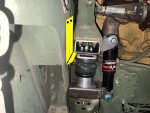I would keep a close eye on the bags and straps. The 83035 shock you chose has at least 1“ more travel than the bag is supposed to have. I have seen 2 different specs for those bags, 3”- 6” and 2.88”- 6.25” Or between 3 and 3-3/8” of travel. That shock has a bump stop and cutoff valve on the extend end which occupies the last 1/2” of travel, but it does not have anything on the compression end…
I started designing mine last year, then had to put it away for a bit to complete other projects. This discussion coaxed me into dragging it back out, as I am also to the point where I need to do it now

After I did some measurements on my one mostly sealed bag to try and calculate the piston surface and volume, I was looking at those chassis tech #2200 bags As they appear to be a good size to replace the originals. I had my selection of shocks down to 3 or 4 Possibilities. The Gabriel catalog is cool in that they publish most all the important information right in their catalog…
The 4 things I understand about airbags is you don't want to exceed design pressure. You need to position them so they cannot rub on ANYTHING, and your mechanical structure must hold them in alignment and restrain movement within their limits. You probably want to protect them from UV as much as possible also...
If the bag can be squished beyond its compressed measurement, the convolutions will rub on each other internally or the internal part of the end crimps can cut into the bags, and eventually they will fail. The only thing to stop this on this shock without a compression bump stop, will be its hard mechanical/metal on metal limit.
When you over-extend a bag it pulls the ends of the bag over against the edges of the crimped caps. This contact/rubbing damages the material and eventually the bag will fail there. The hydraulic cutoff and bump stop in the shock, along with the strap, will limit upward travel. If the bag is on its lower limit with shock fully compressed though, it will exceed bag travel before it even contacts the shock bump stop. How serious this difference is remains to be seen but they picked those compressed/extended numbers for a reason… Straps also don't like being extended and shock loaded for the same reason airbags dont, and if they are limiting the travel will abraid where they pass thru their buckles.
I hope these observations are not taken the wrong way, as that was surely not my intent. I most definitely appreciate any and every journey taken into the unknown, and those brave enough to share the experience

This setup may and probably will run for a very long time without problems because the shock resistance is able to absorb the typical energy and will keep the bag within travel limits under normal conditions. Where you might run into issues is prolonged rough road, where the shock warms up and begins to fade, or as the shock gets old/worn. This will allow greater and greater travel, and shock, bag and strap may start to hit/exceed their limits.
I would be curious exactly how much it moves in normal operation. This could be done fairly easily with a bracket with a hole in it attached to the frame and a rod attached to the cab that passes thru the hole in the bracket. Onto the rod you slide two small pieces of hose, one above the bracket and one below, that have just a little resistance to being slid on the rod . Once inflated to normal ride height, you slide the hose bits up against the bracket top and bottom and go for a drive over your railroad tracks, and then stop and measure the gap between the two pieces of hose that have marked the high and low travel points…
The distance from the normal ride height to the upper and lower limits could also give you an idea how well the spring rate, and the compression/rebound numbers for the shock are dealing with the loads that are being applied… for instance if it goes up farther than it goes down, you could use a shock with less compression dampening, or add some air volume(small tank) to the air spring plumbing, to lower the spring rate to get the movement more into the center of allowable travel.




